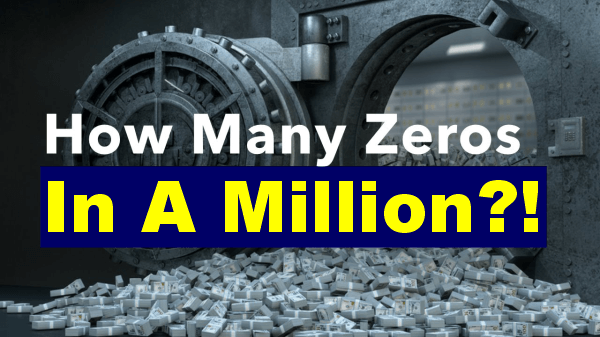How many Zeros in 1 MillionIn mathematics, we come across many words, and one million is one such word. Have you ever wondered - "How many zeros are there in millions?" "Is a billion a bigger number than a million?" There is even a decillion, a number which is a lot bigger than a million. 
Like million, there are other mathematical units like trillion, quadrillion, quintrillion, sextillion, septillion, octillion, nonillion, and decillion. These vast numbers are frequently used, but as they grow larger, the number of zeros in each word may become confusing. The larger the number, the more difficult it is to remember how many zeros are in it. However, in this article, we discuss or explain the number of zeros in a million. But first, let's go over the fundamentals before moving on to the calculations of zeros in a million. First, we must understand what the significance of zero is and what a million is. So, let's get started! Understanding about a MillionA million is a number that equals 1,000,000 (1 followed by six zeros). 10^6 is another way to write it. It is used to count a lot of things because it is a very big number. It is a number used in the international numeral system, whereas according to the Indian place value system, a million is equivalent to ten lakhs. One million equals one thousand thousand. The ancient Italian word "milione" is the origin of the word million. One million seconds, for example, is equivalent to 11 days, 13 hours, and 46 minutes. Another example would be that one million minutes is roughly equal to two years. In general, the money is often counted in millions. For example, 1 million dollars is equivalent to $1,000,000. If someone has $1 million in the bank, they may use it to buy a number of things or put it toward stocks, bonds, or other investments. Brief Understanding of a ZeroA zero is a number that is used to indicate a lack of any quantity or an amount of nothing. It is the representation of emptiness or nothingness in numbers. Zero is represented by the number 0. Zero is neither a positive nor a negative number. In mathematics, zero is a significant number because it may be used as a stand-in for many operations, such as addition and multiplication. When counting, it can also be used to denote a lack or absence of a number. The concept of zero is important in algebra, where it is used to denote the absence of an unknowable number. For instance, you can set the equation to zero if you are attempting to solve for the unknown variable x. Zero is also significant in calculus since it is used to denote a function's maximum or limit. In other words, if a function reaches a specific point and then declines or grows, the point at which it stops is the function's limit or maximum. 0 is the symbol for this position. However, zero can increase any number significantly when added to the end. Concept of Calculating the Number of Zeros in a MillionAccording to the Indian place value system, there is always a zero placed at the end of each huge value, such as a million, billion, trillion, etc. For example, the number 10 has only one zero, 100 has 2 zeros, a thousand has 3 zeros, ten thousand has 4 zeros, one lakh (also called a hundred thousand) has 5 zeros, and ten lakh has 6 zeros. And when we compare the international and Indian numeral systems, we find that one million equals ten lakhs. Therefore, the zeros in ten lakhs are the same as the zeros in one million. So, by adding a zero to every succeeding number, we can increase any value. How many Zeros in a Million?Now we are familiar with the meaning of a million and a zero. It's time to calculate the number of zeros in one million. As we mentioned earlier, the term 'million' is used in the international numeral system, and when compared to the Indian numeral system, one million is equivalent to ten lakhs. Since 10 lahks (1 million) can be written as 1000 × 1000 (the product of thousand and thousand), it equals 10,00,000. Now, we can easily count the zeros in the value; we can say that one million consist of a total of six zeros. Since 1 million is equal to 1000x1000 and there are three zeros in one thousand; therefore, the product of one thousand and one thousand will have 6 zeros. As a result, it is concluded that there are 6 zeros in one million (1,000,000).
Next TopicCube Root 1 to 20
|
 For Videos Join Our Youtube Channel: Join Now
For Videos Join Our Youtube Channel: Join Now
Feedback
- Send your Feedback to [email protected]
Help Others, Please Share










